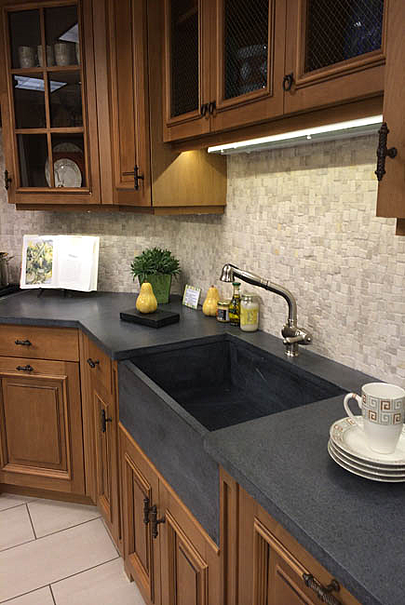 Soapstone countertops have become increasingly popular due to their smooth, dense composition and a sleek modern appearance. It is a beautiful shade of grey that can range from light to almost black.
Soapstone countertops have become increasingly popular due to their smooth, dense composition and a sleek modern appearance. It is a beautiful shade of grey that can range from light to almost black.
Soapstone is quarried, just like other natural stone countertops. It is cut into slabs and polished for appearance or can be honed. There are two different types of soapstone. The first is knows as talc and it is exceptionally soft. It is used in the cosmetic industry for things like baby powder and toothpaste, and is also used for sculptures and refractory materials. The second type of soapstone is called steatite, which is comprised of talc and other minerals, one of which is quartz. Quartz is one of the hardest minerals on earth and provides the strength and durability that makes steatite soapstone an option for kitchen countertops.
Pros of Soapstone Countertops
Beautiful dark color. Unlike other natural stones, which may be a unpredictable in slab form, soapstone is naturally a consistent light grey-ish to dark grey color, and sometimes it has a hint of green or even a soft blue. There may be of lighter colored veins or patterned striations, which add visual interest. Dark countertop colors are trending right now, which can make soapstone a smart choice for a kitchen remodel as it will appeal to future homebuyers.
Nonporous surface. Since soapstone is so dense, it is considered nonporous. The lack of pores means that liquids, oils, and other staining agents won't be able to penetrate or weaken the stone. It is virtually impossible to stain it and makes it a very hygienic countertop surface. This is one of the reason why soapstone has commonly been used for chemistry labs, acid rooms, and other industrial applications where preventing cross-contamination is essential.
Cost-efficient. Soapstone is slightly more expensive than other mid-range natural stones, such as granite, but provides the same natural stone look and feel. Because it is softer than granite, quartz, or quartzite, it is also easier for fabricators to work with, which can reduce labor costs.
Easy to repair. Your soapstone countertop will be more prone to scratching than harder natural stones but the same trait that causes this - its softness - also makes it easy to sand, buff or oil out minor scuffs and scratches.
Heat resistant. You will never need to worry about hot pots or pans damaging the surface. Hot items can be placed directly on it with no ill effects.
Cons to Using Soapstone for Kitchen Countertops
It's a softer stone. Because of the high talc content, soapstone is considered a softer stone, which means it can be more prone to scratching or dings.
Color darkening. Soapstone will continue to darken overtime, which may be a pro for many. However, if you are in love with lighter grey soapstone countertops, know that they will darken with age and use.
Regular oiling. In order to keep the natural darkening process consistent, it's recommended that you apply mineral oil on a routine basis.
Contact Kitchens & Baths Unlimited, Inc. to learn more about soapstone countertops.



